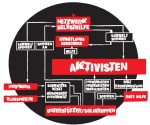 THE G8 IS EVERYWHERE, SO ARE WE !
THE G8 IS EVERYWHERE, SO ARE WE !
Thursday, May 26, the activists occupy Standard & Poor’s
While the financial crisis hits a nearly bancrupt Europe, things have yet to change.
The problem remains the same:
Faced with private financial crisis, the only proposed solution is a policy of public austerity.
It ensures that the cost of economic irresponsibility is assumed by the majority of the population, including the most vulnerable. Globalizing austerity for the people, expanding the playground of multinationals, thus the project of the G8 and G20 could be summarized.
In response to this logic, at the time when the powerful gather at the G8 meeting in Deauville, we decided to occupy the Standard & Poor’s rating agency.
This occupation means to point the finger at what we oppose every day: an economic system and policies that favour multinationals, banks and financial institutions at the expense of the people. Globalizing austerity and wars, causing environmental destruction and creating individualism and the destruction of social ties.
Why do we focus on rating agencies ?
The rating agencies are involved in an ultra-liberal logic:
When a state, a company or local government borrows money on capital markets, rating agencies assign them an estimation of their ability to repay the loan. This rating allows borrowers to access the capital markets. Under the guise of assessing their creditworthiness, agencies contribute to extending market-friendly policies though mesures of austerity.
A connivance with the financial markets:
Standard & Poor’s has almost the same shareholders as other rating agencies (Barclays Investment Funds and Companies U.S. Investment).
The rating agencies have been accused several times of giving too good notes to bad financial products, especially those containing subprime in 2008 :
In 2001, Standard & Poor’s and Moody’s value the Enron investment grade (the better category). Soon after, the company has declared bankrupt.
In 2008, Lehman Brothers gets the highest rating on the eve of its collapse.
In June 2010 the Inquiry Committee of U.S. Congress on the financial crisis (FCIC) revealed that Moody’s employees were pressured into assigning favorable ratings of risky financial products in order to ensure the signing of contracts.
The rating agencies are not neutral evaluators, but are in league with financial marketeers and contribute actively in promoting a logic of a neo-liberal economy.
The rating agencies are speculating with the public debt of countries with difficulties:
They trigger speculative waves while at the same time awarding bad debt ratings to a country. Because of these poor ratings Greece, Portugal, Spain, Ireland and Iceland are placed in disastrous situations.
For these countries, it becomes a vicious circle: borrowing to pay off debt, reducing deficits to borrow again, cutting public spending to reduce deficits, ad infintum.
Consequences: budget cuts, wage freeze, increased work time, pushing back the age of retirement, decommissioning services (education, health), privatisation of public goods and the repression of protest movements, like in Greece for example. Rating agencies are thus directly responsible for the repressive policies against people. Those policies are basically to curb any revolt against the system that feeds them.
– Interference into state policy:
The rating agencies don’t hesitate to make recommendations to the states they value, which is a direct blackmail in order to impose regressive policies. Japan has therefore received lower ratings after the earthquake and the nuclear disaster in Fukushima. Budgetary adjustements have been recommended in order to remedy their bad rating! This is at odds with any spirit of solidarity.
Belgium was also summoned by Standard & Poor’s to review its pension system and to reduce its debt to compensate for the aging of its‘ population.
The rating agencies are quick to place the country under pressure, imposing their own political line. On August 17, 2010, Moody’s threatened four States, including France and Germany, in a succinct statement: «the challenges of fiscal adjustment implies that the possible downgrade of your rating is getting closer». This was followed by a implementation of the usual recommendations of the rating agencies and markets: pension reforms this autumn in France, job cuts in state education, not replacing public servants, destruction of the health system and social security, etc. If France has maintained an excellent rating, it’s only because its civil servants are willing to comply with the recommendations and ultimatums of rating agencies.
Regulating or changing the system ?
We do not believe in an ethical or more „human“ capitalism. Since the financial crisis has begun, rating agencies have been reprimanded by the European Union. The leaders of the three major agencies (Standard & Poor’s, Moody’s and Fitch) have appeared in front of the U.S. senate in June 2010 to explain themselves, yet nothing has changed since. Even though their responsibility in the financial crisis in some countries has been shown, their very existence was not questioned.
Moreover we are not asking the disappearance or restriction of rating agencies. Even if their grades were reliable and could be questioned, they would only play another role in the economic and financial system of which we disapprove. Just as the IMF, WTO, World Bank, the G20 and the G8 are a part of the market system, their disappearance wouldn’t change the absurd economic system which we are subordinated to.
We see no interest in closing the rating agencies if it does not fit into the abolition of the capitalist economic system in which they operate. We want out of this profoundly inhumane and inherently unequal system !
This action is part of a European framework for decentralized actions.
Currently, 33 cities in 6 countries have already publicly announced their protests (the action map is being updated on the blog).
Below you will find all necessary informations on the decentralized days of action against the G8.
Contact Paris: +33 6 10 47 74 13 or +33 760335628
infoparis_nog2011@riseup.net or nog2011@riseup.net
Action Blog: http://nog8actions.noblogs.org/
Action map: http://goo.gl/0ULtk
Twitter: https://twitter.com/#!/NoG2011France
Source: email
